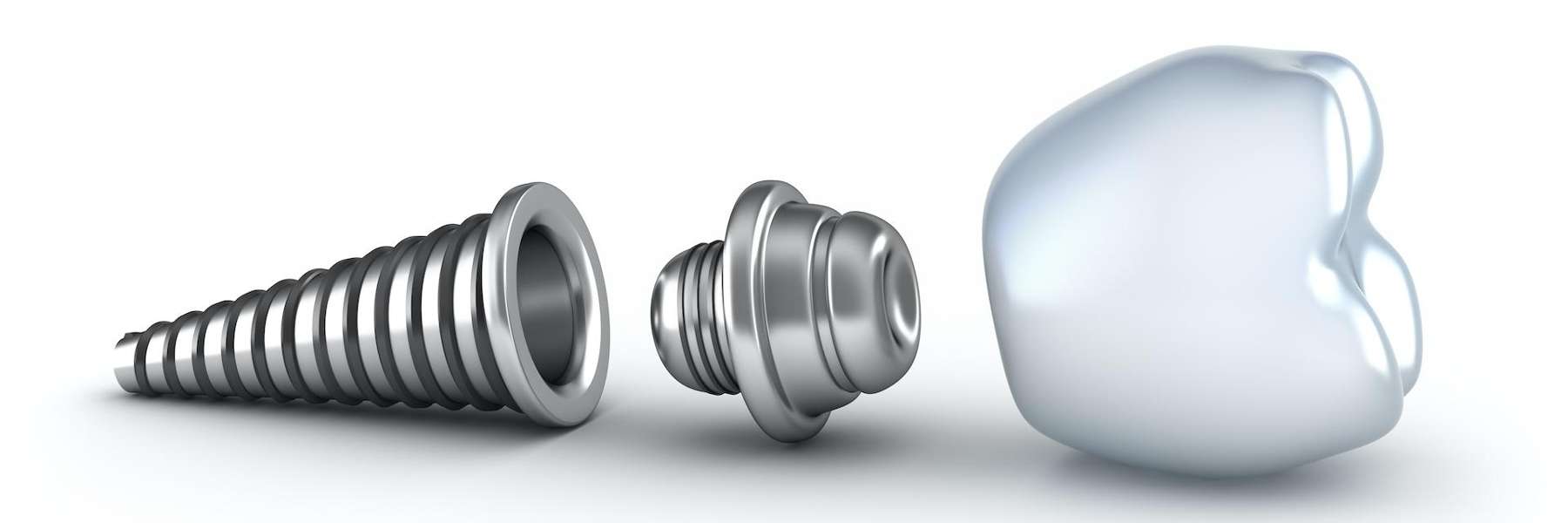
As anyone who's suffered from tooth loss will attest, it's extremely important to address the area in the mouth where the tooth/teeth used to be.
For patients who are missing one or more teeth and cannot or do not want to get dentures, bridges, or crowns, dental implants are an excellent option. Of course, as with any medical procedure, proper post-procedure care is required with dental implants to ensure long-term effectiveness, as well as to prevent gum disease plaque and tartar buildup around the site of the implant. However, with proper care, dental implants will provide a natural looking and feeling alternative to natural teeth.
Today, we are briefly examining what dental implants are, when they are necessary, and how to properly care for dental implants.
What Are Dental Implants?
Dental implants are a permanent solution to tooth loss in which artificial roots are surgically implanted into the jawbone and often covered with a porcelain crown. Dental implants are designed to look and function exactly like natural teeth and offer the added benefit of replacing not just the lost tooth but the root. As an added benefit, with proper care, a dental implant can be expected to last at least a decade, if not longer, without the need for retreatment.
When and Why Are Dental Implants Necessary?
The need for dental implants stems largely from poor oral hygiene, namely not brushing and flossing daily, and rinsing regularly with antibacterial mouthwash. Poor dental hygiene can result in a variety of negative effects on both oral and overall health. This most commonly manifests in plaque and tartar buildup, gum disease, and tooth decay, all of which are direct causes of gum disease and tooth decay, which can result in tooth loss. Beyond this, the need for dental implants could also stem from the impact of an accident that results in tooth loss.
Whatever the cause, in the aftermath of tooth loss, the affected area can be susceptible to infection, leading to other medical issues. And while bridges, crowns, or dentures provide necessary protection to this part of the mouth, dental implants offer the most durable and natural looking and feeling replacement.
Can Anyone Get Dental Implants?
While dental implants are an excellent solution for patients who've experienced tooth loss, they are, unfortunately, not right for everyone. Anyone receiving dental implants generally must:
- Be at least 18 years of age
- Have fairly healthy gums
- Have a jawbone structure that is strong enough to support an implant
Thus, before proceeding with implants, patients must consult with a dentist or oral surgeon to review their medical histories in order to determine whether they are good candidates.
Tips For Caring For Your Dental Implants
For those who do qualify as candidates for dental implants, we're offering some tips on how to help ensure those implants' long-term success through proper post-procedure care:
- Practice good oral hygiene – Like natural teeth, dental implants require good oral hygiene. This includes brushing at least twice daily with a soft-bristled toothbrush and fluoride toothpaste, rinsing daily with an antibacterial mouthwash, and flossing regularly to remove food particles and plaque.
- Regular dental checkups – Patients with dental implants should schedule regular checkups with their dentist to ensure the health of their dental implants.
- Avoid hard and sticky foods – Hard or sticky foods – popcorn kernels, hard candy, chewing gum, caramel, and the like – should be avoided as much as possible, as they can damage dental implants or pull them out of place.
- Quit smoking – Smoking can increase the risk of implant failure by reducing blood flow to the gums and bones that support the implant. Smokers receiving implants should consider quitting to improve the longevity of their dental implants.
- Use a mouthguard – Patients who, as a result of work or recreational sports, risk impact to the mouth and teeth, as well as those who grind their teeth at night, should consider using a mouthguard.
- Follow your dentist's instructions – as with any medical procedure, each person's body reacts in its own way to dental implants. Thus, it's important to carefully follow the specific care instructions provided by a dentist who is familiar with the patient and their medical history.
By following these tips, you can maintain the health and longevity of your dental implants. Of course, even if you are following all of these steps, if you experience any problems with your implants, such as pain, swelling, or loosening, contact your dentist immediately, as early corrective treatment can prevent further damage and ensure long-term success of dental implants.
Dental Implants in Kalaheo, HI
If you're in the Kalaheo area and think dental implants might be an appropriate solution for you, contact dentist Dr. Michael Lutwin and the team at Kalaheo Dental Group to schedule a consultation appointment.











